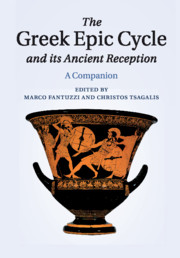Book contents
- Frontmatter
- Contents
- List of illustrations
- List of contributors
- Editorial note
- Introduction: Kyklos, the Epic Cycle and Cyclic poetry
- PART I APPROACHES TO THE EPIC CYCLE
- PART II EPICS
- PART III THE FORTUNE OF THE EPIC CYCLE IN THE ANCIENT WORLD
- 22 The aesthetics of sequentiality and its discontents
- 23 The Epic Cycle, Stesichorus, and Ibycus
- 24 Pindar's Cycle
- 25 Tragedy and the Epic Cycle
- 26 The Hellenistic reception of the Epic Cycle
- 27 Running rings round Troy: Recycling the ‘Epic Circle’ in Hellenistic and Roman art
- 28 Virgil and the Epic Cycle
- 29 Ovid and the Epic Cycle
- 30 Statius' Achilleid and the Cypria
- 31 The Epic Cycle and the ancient novel
- 32 The Epic Cycle and imperial Greek epic
- Works cited
- Index of principal passages
- Index nominum et rerum
30 - Statius' Achilleid and the Cypria
from PART III - THE FORTUNE OF THE EPIC CYCLE IN THE ANCIENT WORLD
Published online by Cambridge University Press: 05 August 2015
- Frontmatter
- Contents
- List of illustrations
- List of contributors
- Editorial note
- Introduction: Kyklos, the Epic Cycle and Cyclic poetry
- PART I APPROACHES TO THE EPIC CYCLE
- PART II EPICS
- PART III THE FORTUNE OF THE EPIC CYCLE IN THE ANCIENT WORLD
- 22 The aesthetics of sequentiality and its discontents
- 23 The Epic Cycle, Stesichorus, and Ibycus
- 24 Pindar's Cycle
- 25 Tragedy and the Epic Cycle
- 26 The Hellenistic reception of the Epic Cycle
- 27 Running rings round Troy: Recycling the ‘Epic Circle’ in Hellenistic and Roman art
- 28 Virgil and the Epic Cycle
- 29 Ovid and the Epic Cycle
- 30 Statius' Achilleid and the Cypria
- 31 The Epic Cycle and the ancient novel
- 32 The Epic Cycle and imperial Greek epic
- Works cited
- Index of principal passages
- Index nominum et rerum
Summary
The proem of the Achilleid explicitly mentions Homeric poetry as a precursor in treating the deeds of Achilles:
Magnanimum Aeaciden formidatamque Tonanti
progeniem et patrio vetitam succedere caelo,
diva, refer. Quamquam acta viri multum inclita cantu
Maeonio (sed plura vacant), nos ire per omnem
– sic amor est – heroa velis Scyroque latentem
Dulichia proferre tuba nec in Hectore tracto
sistere, sed tota iuvenem deducere Troia.
Goddess, tell of the great-hearted Aeacides and the offspring that caused fear for the Thunderer and was forbidden to be the successor to his father's heaven. Although the man's acts have been much celebrated in Homeric poetry, there are more, and may you wish for me to go through the entirety of the hero (that is my desire), to bring him out by Odysseus' trumpet as he hides on Scyros, nor to stop with the dragging of Hector, but to describe the youth in the entire Trojan saga.
Maeonio is a periphrastic but unambiguous reference to Homer (e.g. Hor. C. 1.6.2), and the Homeric frame is reinforced by the invocation that dubs the Muse a diva, a Latin translation for the goddess who appears at the start of the Iliad. Statius also claims that he wants to tell Achilles’ story without stopping at the dragging of Hector's body in the dust, one of the most prominent events in the Iliad. That the poet articulates his aims in seven verses and then turns to the divine source of his inspiration in the eighth verse (1.8. tu modo … Phoebe) mimics the structure of the proem of the Aeneid, but Virgil's preface reworks the proem of the Iliad and its own seven-verse opening sentence. In this regard, Statius operates within the tradition of the Homeric proem. The heroic context is also reinforced by words such as inclita, which is etymologically connected to the Greek kleos and cognate Homeric epithets, and acta, which recalls the exploits of famous Greeks such as the Argonauts (Val. Flac. 1.40) and Hercules (Ov. Met. 9.134, 247; Stat. Theb. 4.826).
- Type
- Chapter
- Information
- The Greek Epic Cycle and its Ancient ReceptionA Companion, pp. 578 - 595Publisher: Cambridge University PressPrint publication year: 2015



